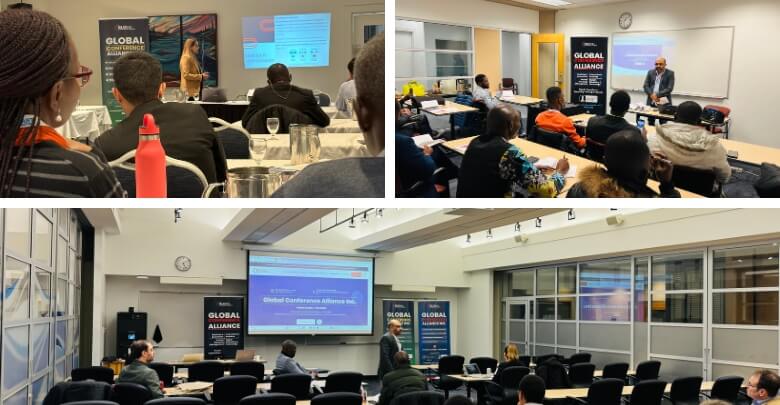For professionals, conferences serve as an ideal place where they can exchange ideas and expand their networks. You might be wondering how to participate in such events. But first, you may have a question in your mind: How do you get invited to conferences?
To get invited to conferences, you need to focus on building your reputation, networking, and enhancing your visibility. Speak at local events, submit abstracts, and collaborate with experts. Establishing an online presence is also key. Be active in your field, share valuable insights, and make connections that could lead to an invitation.
Are you curious about how you can make this happen and become part of impactful events? This article has all the information you need, guiding you on every step toward conference participation.
Why Are Attending Conferences Worth Your Time?
Attending conferences is a valuable investment of your time, offering opportunities to expand your knowledge, connect with industry leaders, and stay updated on the latest trends. These events provide a platform to share ideas, gain insights, and explore innovative solutions to real-world challenges, making them essential for personal and professional growth.
Conferences also enable you to build a global network. Interacting with professionals from diverse backgrounds encourages collaboration and opens doors to new partnerships. Whether you are a researcher, entrepreneur, or industry expert, these connections often lead to career-enhancing opportunities and long-term collaborations.
With conferences held in various countries, including the USA, participants gain exposure to different cultures and perspectives. For those planning to grow internationally, joining upcoming conferences in USA offers an opportunity to meet global leaders, showcase expertise, and bring back valuable insights to your organization.
How Do You Get Invited to Conferences?
Receiving conference invitations frequently necessitates a combination of visibility, expertise, and networking. Conference organizers typically look for individuals who offer valuable insights, have a strong online presence, or possess relevant experience in a field. Here’s how you can secure an invitation:
Build Your Reputation in Your Field
Establishing a solid reputation in your area of expertise is crucial. Engage in speaking opportunities, contribute to industry blogs, and publish research papers. This helps conference organizers see you as a valuable speaker. Consistently contributing to discussions makes you more likely to be recognized by those who organize such events.
Participate Actively in Online Communities
Active participation in online communities related to your industry is important. Sharing your insights and experiences through social media platforms, webinars, and online forums allows you to showcase your expertise. This online presence can grab the attention of conference organizers looking for skilled speakers.
Submit Abstracts to Conference Organizers
Many conferences have open calls for speakers or abstract submissions. Submitting an abstract can demonstrate your expertise and interest in participating. It’s an opportunity to show your ability to present complex ideas simply and engagingly. Organizers often look for individuals who contribute innovative ideas to the field.
Offer to Speak at Smaller Events
Speaking at smaller or local events is a great way to gain visibility. It allows you to build a portfolio of public speaking experience. As you gain confidence and a track record of speaking engagements, you’ll be more likely to catch the attention of major conference organizers. It’s an excellent stepping stone.
Collaborate with Other Professionals
Opportunities to speak may arise from working on projects, research, or presentations with other experts. Contributing to papers or working together on initiatives shows you are a team player and willing to share your knowledge. Such collaborations often attract attention from conference organizers seeking diverse speakers.
Network with Industry Leaders
Getting invited to conferences requires a lot of networking. Start by finding conferences to attend that are relevant to your field, then use these opportunities to connect with prominent figures. By maintaining these relationships, you increase your chances of being recommended or directly invited by influential people. Networking demonstrates that you are engaged and serious about your professional growth.
Enhance Your Online Presence
A strong online presence is crucial when trying to get invited to conferences. Having a well-maintained professional website or blog, showcasing your work, is essential. Additionally, using platforms like LinkedIn or Twitter to share your insights helps you stay visible to conference organizers looking for experts in your field.
Volunteer for Conferences
Offering your time as a volunteer at conferences can be a great way to gain access to networking opportunities. By working behind the scenes, you can meet organizers and speakers. Volunteering also helps you become more familiar with the structure of conferences and gives you a chance to prove your value.
Follow Up and Stay in Touch
Once you have made initial contacts or submitted proposals, you have to follow up. Maintaining communication with organizers or participants shows that you are genuinely interested in being part of the conference. Staying in touch also keeps you in the loop for future speaking opportunities.
Who Can Send an Invitation to Attend a Conference?
There are different types of invitations for attending conferences, depending on the roles and affiliations involved. Knowing these invite types helps in knowing their importance and value. Here are some people who can send invitations.
- Conference Organizers: The team responsible for planning the event generally sends out invitations. They organize everything from sessions to speakers, making them the primary source for invitations to attendees.
- Speakers and Presenters: Those invited to speak or present at the event often have the authority to send invitations to key individuals or groups who they feel would benefit from attending their session or presentation.
- Industry Associations: Members may receive invitations from industry associations that are associated with the conference topic. These groups typically want to promote networking and growth within the industry, so they invite relevant professionals.
- Event Sponsors: Companies or organizations that sponsor a conference sometimes extend invitations to their clients, partners, or employees. They may want to use the event as an opportunity for networking and business development.
- Academic Institutions: Universities and research centers involved in a conference often send invitations to professors, researchers, and students. These invitations are typically intended to enhance knowledge sharing and promote academic collaboration.
- Government or Regulatory Bodies: When a conference is tied to policy or regulation, government agencies or officials may send out invitations. These invites are often aimed at promoting public policy, legal updates, or industry regulations.
In many cases, the person sending the invite plays a key role in making sure that the right people attend and benefit from the event. Conference invitations are designed to meet specific goals, whether networking, knowledge sharing, or collaboration.
What Types of Conferences Should You Target?
Finding the right conferences can significantly improve both your personal and professional growth. With so many options available, targeting the right ones will ensure you make the most of your time and investments. Here are some types of conferences you should consider.
Industry-Specific Events
Taking part in industry-specific events gives you insight into the latest trends, research, and best practices in your field. These conferences often feature prominent experts and provide a space for targeted networking. Learning how to identify conferences specific to your industry ensures you’re staying up-to-date with the most relevant information and opportunities.
Skill-Development Summits
The goal of skill-development summits is to support your professional development through hands-on workshops and engaging sessions. These events are often designed to teach valuable skills, from technical expertise to soft skills. Exploring conferences dedicated to skill-building helps you make strategic decisions for your personal growth.
Cross-Disciplinary Gatherings
People from various industries gather for cross-disciplinary meetings to encourage creativity and exchange ideas. These events are excellent for expanding your perspective and tackling complex problems through collaboration. Learning ways to find real conferences that draw a diverse group of professionals can open doors to innovative partnerships and fresh approaches.
Leadership and Strategy Conferences
Conferences on strategy and leadership concentrate on improving your ability to lead and comprehend business plans. These events often feature inspirational speakers and case studies from successful leaders. Discovering conferences that cater to leadership development helps you gain practical insights to improve your team management and organizational planning.
Emerging Technology Forums
The most recent developments in science, technology, and innovation are the main topics of emerging technology forums. They provide an excellent opportunity to learn about cutting-edge advancements in fields like AI, blockchain, and sustainability. Knowing how to find conferences dedicated to these technologies ensures you remain on the leading edge of future developments.
Common Mistakes to Avoid When Seeking Invitations
When seeking invitations, approach the situation with respect and understanding. Avoiding common mistakes can improve your chances and encourage positive connections. Keep these tips in mind to deal with the process smoothly.
- Overly Demanding Requests: Making requests that feel too forward or insistent can lead to discomfort. Always be polite and considerate when asking for an invitation, showing gratitude regardless of the outcome.
- Being Impatient: Asking for an invitation and expecting an immediate response can create pressure. Recognize that the person you’re seeking an invite from may need time to consider or make decisions.
- Failing to Express Appreciation: Never forget to express your thanks, regardless of whether the invitation is extended or not. A simple thank you for their consideration can leave a lasting positive impression.
- Ignoring Social Norms: Understand the context in which you’re asking. Ignoring cultural or social expectations can make your request seem out of place and even offend the person you’re reaching out to.
- Being Too Casual: A relaxed tone might be appropriate for friends, but when asking for an invitation from acquaintances or in formal settings, a certain level of professionalism is essential to ensure respect.
- Making Assumptions: Avoid assuming that someone owes you an invitation or that they will offer it just because you’re acquainted. Invitations should never feel like an obligation but a genuine gesture.
- Lack of Understanding of Timing: Asking for invitations at inconvenient or busy times can create unwanted pressure. Make sure you are mindful of the timing and ensure your request is thoughtful in the given context.
Asking for invitations requires a balance of respect, timing, and gratitude. Keep in mind that your approach should always reflect consideration for others’ space and preferences. It’s a respectful way to make meaningful connections and open doors to opportunities.
FAQs About How Do You Get Invited to Conferences?
Here are some common questions about getting invited to conferences. These answers will help you better know the process and provide guidance on how to secure invitations for upcoming events.
How Do Conference Organizers Decide Who to Invite?
Conference organizers look for speakers and attendees who have valuable insights or expertise to share. They typically review your professional background, contributions to the field, and any recommendations from other respected professionals. Your reputation, publications, and previous speaking engagements play a crucial role in your decision.
Can I Get Invited to Conferences If I’m New to the Industry?
Yes, newcomers can absolutely get invited to conferences. The key is to establish a presence in your field, even early on. Engage with others in your industry through online forums, networking events, and by contributing valuable content. Demonstrating your passion and knowledge increases your chances.
What Are the Best Ways to Increase My Visibility to Conference Organizers?
To increase visibility, you should focus on building an online presence through social media platforms, writing articles or blogs, and participating in industry discussions. Regularly sharing your insights on professional topics and engaging with key figures in your field helps ensure that organizers take notice of your expertise.
Should I Apply to Speak at Every Conference I’m Interested In?
No, you shouldn’t apply to every conference. Be selective and focus on events that align with your expertise and career goals. Research each conference to determine whether it’s a good fit. Applying to the right events will increase your chances of being accepted and effectively showcasing your skills.
How Do I Follow Up After Submitting an Abstract?
After submitting an abstract, follow up politely with the conference organizers. Express your continued interest and enthusiasm about the opportunity. If you haven’t received a response in a few weeks, a gentle inquiry about the status of your submission can keep you on their radar without seeming too pushy.
End Note
Conferences are valuable opportunities for networking, learning, and career growth. By participating, you can expand your knowledge, build lasting relationships, and stay ahead in your field. Knowing how to get invited can be the first step toward making the most of these events.
So, how do you get invited to conferences? It often starts with building your professional reputation, engaging in industry discussions, and submitting abstracts for speaking opportunities. Networking and maintaining a strong online presence are key ways to attract invitations from organizers.
To maximize your chances, stay active in your field, volunteer, and follow up on any opportunities that come your way. Keep refining your expertise, and don’t be afraid to put yourself out there. Best of luck in securing those conference invitations and taking your career to new heights!








